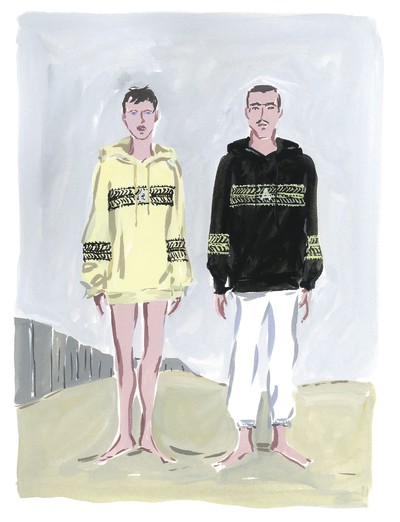Israeli-Palestinian streetwear brand ADISH is the ultimate joint venture.
By Amit Luzon
Illustration by Jean-Philippe Delhomme
Israeli-Palestinian streetwear brand ADISH is the ultimate joint venture.

To say a fashion brand like ours is working towards peace, especially when it comes to a situation like the conflict between Palestine and Israel, might sound like a stretch. At best, it could sound like vague conceptual jargon and bring to mind hollow activist slogans on T-shirts; at worst, it could sound like a marketing ploy, using a tragic state of affairs as a way for a brand to make money.
So, what do we at ADISH actually do? When my partner Eyal Eliyahu and I founded the label, we were interested in a few basic things: fashion, street culture, and the traditional crafts of the Middle East that we’d seen growing up in Israel. This alone isn’t extraordinary, even if fundamentally, an Israeli simply appreciating and valuing Palestinian craft can be taken as a sign of openness, a respect for the ‘other side’s’ traditions, that shows a desire for understanding and acceptance – and for peace.
We began what would become ADISH by figuring out how we could take contemporary streetwear shapes and apply embroidery to them, in new and innovative designs handstitched by Palestinians. With the help of an NGO, we were able to start working with three Palestinian women who live in the West Bank, sampling and producing items featuring their handmade embroidery. With the development of the third collection, ADISH is now working with over 50 Palestinian women who hand-embroider elements onto the garments.
A project of this scope, across a heavily fortified border and into an occupied territory, comes with its own set of hurdles. As Israelis, Eyal and I cannot travel freely to the West Bank, while the embroiderers and other Palestinian members of ADISH cannot travel freely to Israel. The factory where clothing is cut and sewn is in Israel; another is in Palestine. Getting the materials back and forth across the checkpoints and barriers is a crazy logistical circus, mostly done by taxi.
On top of all that, both sides of our team are criticized and as ADISH continues and develops, we have, of course, had to address a series of hard questions. The Israelis are accused of stealing another culture; the Palestinians are accused of being traitors, working with the occupier; and so on. So we ask ourselves: are we taking advantage of these women? Are we appropriating and capitalizing on their culture? Are we normalizing the conflict?
It’s become clear to us that what we are doing isn’t easy, but we believe that that difficulty is actually proof that it is important. The idea that an item of clothing is made in both Israel and Palestine – and that it wouldn’t exist without both places – is so exciting for us. We know that the women we work with are doing so voluntarily; they name the price for their work and are in control of their own production systems. We also work together creatively, and a number of the designs come from the women’s own families, histories and traditions. They also have Palestinian representatives at the NGO who they can speak to at any time – and sometimes do, letting us know, for example, that a deadline is too soon. It’s a relationship built upon mutual respect and of that we’re confident.
As the brand develops and is carried in more stores around the world, such as Opening Ceremony, Slam Jam and Antonioli, the pressure on us all is certainly growing. The women are under more pressure to produce, and so their teams continue to grow. But this pressure also means that more and more Palestinians are earning real income from ADISH, while working at something they enjoy, of which they are proud, creating things they cherish. For us, the pressure comes from the fact that women are now relying on the work we give them, and so we have to do all we can to succeed and ensure they don’t lose their income.
But back to the beginning: what are we at ADISH doing to work towards peace through fashion? The most important way is simply how ADISH shows Israelis that it’s OK to embrace Palestinians, and vice versa. It shows both sides that there are many on both sides willing to do it and already doing it. It shows the world that the conflict is more complicated than simply two sides against each other, black and white. It shows the world that not every Israeli and Palestinian feels the same way. In a situation where there is so much violence and hatred, we feel that ADISH, born out of respect and compassion, understanding and exchange, is resisting division. We hope it is setting an example – and so by doing so, slowly moving towards peace.